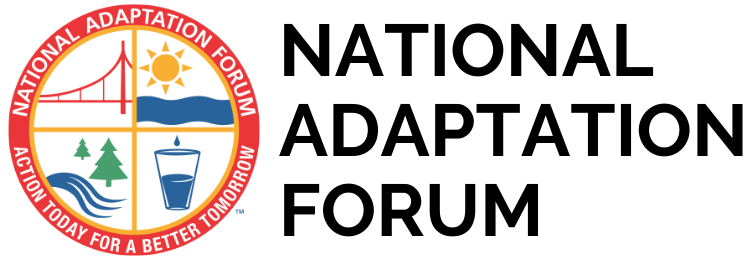About the Forum
The National Adaptation Forum is a biennial convening for adaptation professionals to innovate, network, and focus on established and emerging climate adaptation issues of the day. The Forum provides opportunities for professional development through training sessions, facilitated presentations and panels, and formal and informal networking sessions.
At its core, the Forum is cross-disciplinary, bringing together practitioners from a variety of sectors, spanning natural, built, and social systems. Participants include representatives from federal, state and tribal governments, nonprofit organizations, businesses, scientists, and frontline community groups. Participants are managers, planners, and service providers. They focus on built environments and ecosystems. The Forum program covers over 35 adaptation-related topics and 12 geographic regions across the U.S. and beyond. We encourage the submission of unique ideas and attendance from adaptation-adjacent sectors – it’s only by working together will we solve the challenges posed by climate change.
The overall goal of the National Adaptation Forum is to move beyond adaptation awareness into adaptation action by highlighting the breadth of adaptation activities occurring in the United States and around the world. We aim to bring together practitioners with a variety of experiences and expertise, so as a field, we spend more time innovating rather than reinventing.
Our Goals
- Provide a professional development opportunity for adaptation practitioners
- Contribute to the development of a community of practice around climate adaptation
- Create a space for practitioners to share information, progress, and strategy, building the capacity of the community as a whole and its individuals
- Support on the ground implementation by providing practitioners with a community to exchange knowledge of and tools for incorporating climate adaptation into their work
History of the Forum

The National Adaptation Forum was created by a diverse group of professional adaptation practitioners from the private and public sector concerned about the need to anticipate and prepare for the impacts of climate change. It represents a collective effort to enhance the resilience of the Nation’s communities, natural systems, and economy in the face of a changing climate, through open participation from practitioners across the country.
Since 2013, EcoAdapt has hosted six in-person Forums across the country, drawing in over 5,345 participants from a wide spectrum of sectors and regions who are integrating climate adaptation into their day-to-day activities. In the time between in-person events, EcoAdapt hosts virtual National Adaptation Forum series to showcase different adaptation-related topics.

The Forum is coordinated by EcoAdapt, a 501(c)(3) nonprofit organization that helps to build the field of climate change adaptation and offers adaptation support, training, and assistance to make planning and management outcomes less vulnerable to climate change. The Forum would not be possible without our sponsors, whose support reflects the community spirit of the adaptation field.
As the field of climate adaptation grows and changes, the Forum does as well. We aim to meet the needs of the field while remaining a reliable venue for professional development, networking, and information sharing.
Adaptation Pledge
In 2015, National Adaptation Forum participants collaborated on the creation of an Adaptation Pledge for everyone to use in our work as a common point of reference in our collective endeavors. We invite you to share this pledge with your partners as a tool for good practice. It is not meant to be a guide to adaptation best practices. Rather it is meant to provide a philosophical framework within or upon which we can work toward better long-term outcomes for all.
Adaptation Pledge
I pledge to create a durable future for my community and the environment, at home and at work, by thinking about the future in all I do.
I COMMIT TO:
Use best available science and knowledge: Considering present, past, and future conditions in my actions.
Decide with, not for: Invite, recruit and promote the broadest diversity of partners and stakeholders in conversations and decisions in my community.
Build climate equity: Work to ensure the equitable sharing of the benefits of resilience-building and the equitable bearing of the costs of climate change.
Safeguard integrity: Ensure transparency, accountability & follow-through.
Minimize harm: Evaluate how actions might affect other people, living things, places, goals and endeavor to minimize adverse impacts while maximizing common benefits.
Be honest about the challenges: Give voice to the fact that resilience requires adaptation to create it and mitigation to maintain it.
Foster an inspired community: Use the knowledge that a long-term plan and vision that engages and inspires the community comes from tapping into hope and creativity.
Adapt holistically: Your community is affected by & affects the world around you.

